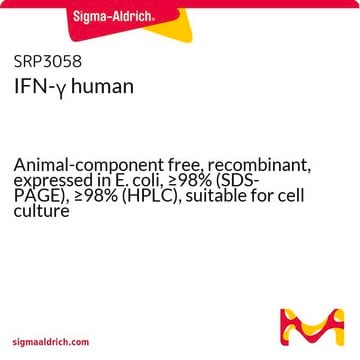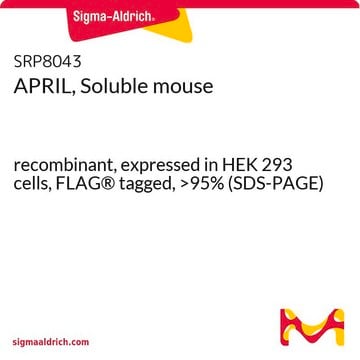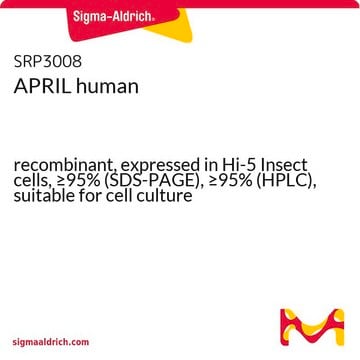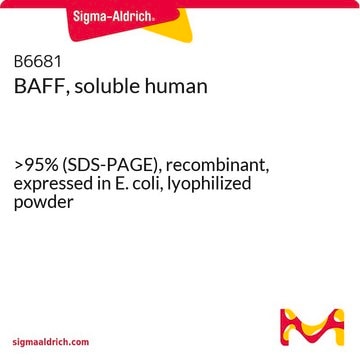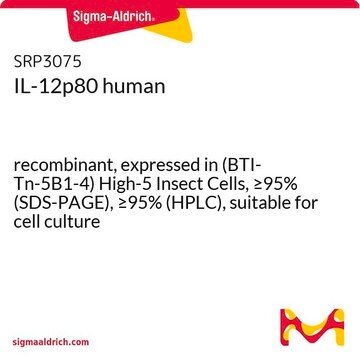SRP3305
BAFF human
Animal-component free, recombinant, expressed in E. coli, ≥98% (SDS-PAGE), ≥98% (HPLC)
Synonym(s):
TALL-1, THANK, TNFSF13B, TNFSF20
Sign Into View Organizational & Contract Pricing
All Photos(1)
About This Item
UNSPSC Code:
12352202
NACRES:
NA.32
Recommended Products
biological source
human
recombinant
expressed in E. coli
Assay
≥98% (HPLC)
≥98% (SDS-PAGE)
form
lyophilized
mol wt
17.0 kDa
packaging
pkg of 20 μg
impurities
endotoxin, tested
UniProt accession no.
shipped in
wet ice
storage temp.
−20°C
Gene Information
human ... TNFSF13B(10673)
General description
BAFF, a member of the TNF superfamily of ligands, is expressed in T cells, macrophages, monocytes and dendritic cells. BAFF is involved in stimulation of B and T cell function, and is an important survival and maturation factor for peripheral B cells. BAFF signals through three different TNF receptors TACI, BCMA and BAFF-R. The human BAFF gene codes for a 285 amino acid type II transmembrane protein containing a 46 amino acid cytoplasmic domain, a 21 amino acid transmembrane domain, and a 218 amino acid extracellular domain. Recombinant human soluble BAFF is a 152 amino acid polypeptide (17.0 kDa), which contains the TNF-like portion of the extracellular domain of BAFF.
Biochem/physiol Actions
BAFF, a member of the TNF superfamily of ligands, is expressed in T cells, macrophages, monocytes and dendritic cells. Recombinant human soluble BAFF is a 152 amino acid polypeptide (17.0 kDa), which contains the TNF-like portion of the extracellular domain of BAFF.
Physical form
Lyophilized from 20 mM Tris, pH 8.0 + 150mM NaCl.
Reconstitution
Centrifuge the vial prior to opening. Reconstitute in water to a concentration of 0.1-1.0 mg/ml. Do not vortex. This solution can be stored at 2-8°C for up to 1 week. For extended storage, it is recommended to further dilute in a buffer containing a carrier protein (example 0.1% BSA) and store in working aliquots at -20°C to -80°C.
Storage Class Code
11 - Combustible Solids
WGK
WGK 3
Flash Point(F)
Not applicable
Flash Point(C)
Not applicable
Certificates of Analysis (COA)
Search for Certificates of Analysis (COA) by entering the products Lot/Batch Number. Lot and Batch Numbers can be found on a product’s label following the words ‘Lot’ or ‘Batch’.
Already Own This Product?
Find documentation for the products that you have recently purchased in the Document Library.
Xiao-Juan Zhu et al.
British journal of haematology, 166(5), 783-791 (2014-06-04)
To investigate the expression of tumour necrosis factor superfamily 13B (TNFSF13B) receptors in immune thrombocytopenia (ITP) and their correlation with disease activity, we investigated the protein and mRNA levels of TNFSF13B, tumour necrosis factor receptor superfamily 13C (TNFRSF13C), TNFRSF13B and
Rita R Barbosa et al.
Journal of clinical immunology, 34(5), 573-583 (2014-05-09)
B-cell survival and differentiation critically depend on the interaction of BAFF-R and TACI with their ligands, BAFF and APRIL. Mature B-cell defects lead to Common Variable Immunodeficiency (CVID), which is associated with elevated serum levels of BAFF and APRIL. Nevertheless
T J Waldschmidt et al.
Science (New York, N.Y.), 293(5537), 2012-2013 (2001-09-15)
What determines whether transitional B cells newly emerged from the bone marrow will differentiate further to become mature, long-lived, circulating B lymphocytes? In a Perspective, Waldschmidt and Noelle discuss new findings showing that the TNF family ligand BAFF and its
J Wild et al.
Leukemia, 29(8), 1676-1683 (2015-02-25)
Natural killer (NK) cells are cytotoxic lymphocytes that substantially contribute to the therapeutic benefit of antitumor antibodies like Rituximab, a crucial component in the treatment of B-cell malignancies. In chronic lymphocytic leukemia (CLL), the ability of NK cells to lyse
Nuoyan Zheng et al.
BMC nephrology, 16, 72-72 (2015-05-16)
B cell activating factor belonging to the TNF family (BAFF) is vital for B cell survival, proliferation and activation. Evidence indicates that BAFF is systemically or locally increased in glomerulonephritis (e.g. lupus nephritis, IgA nephropathy). However, the effect of BAFF
Our team of scientists has experience in all areas of research including Life Science, Material Science, Chemical Synthesis, Chromatography, Analytical and many others.
Contact Technical Service